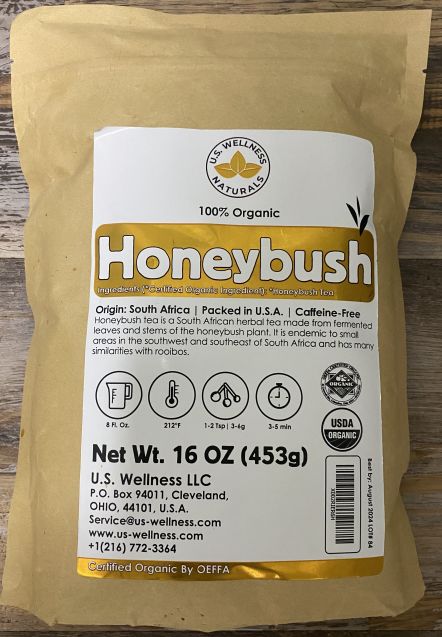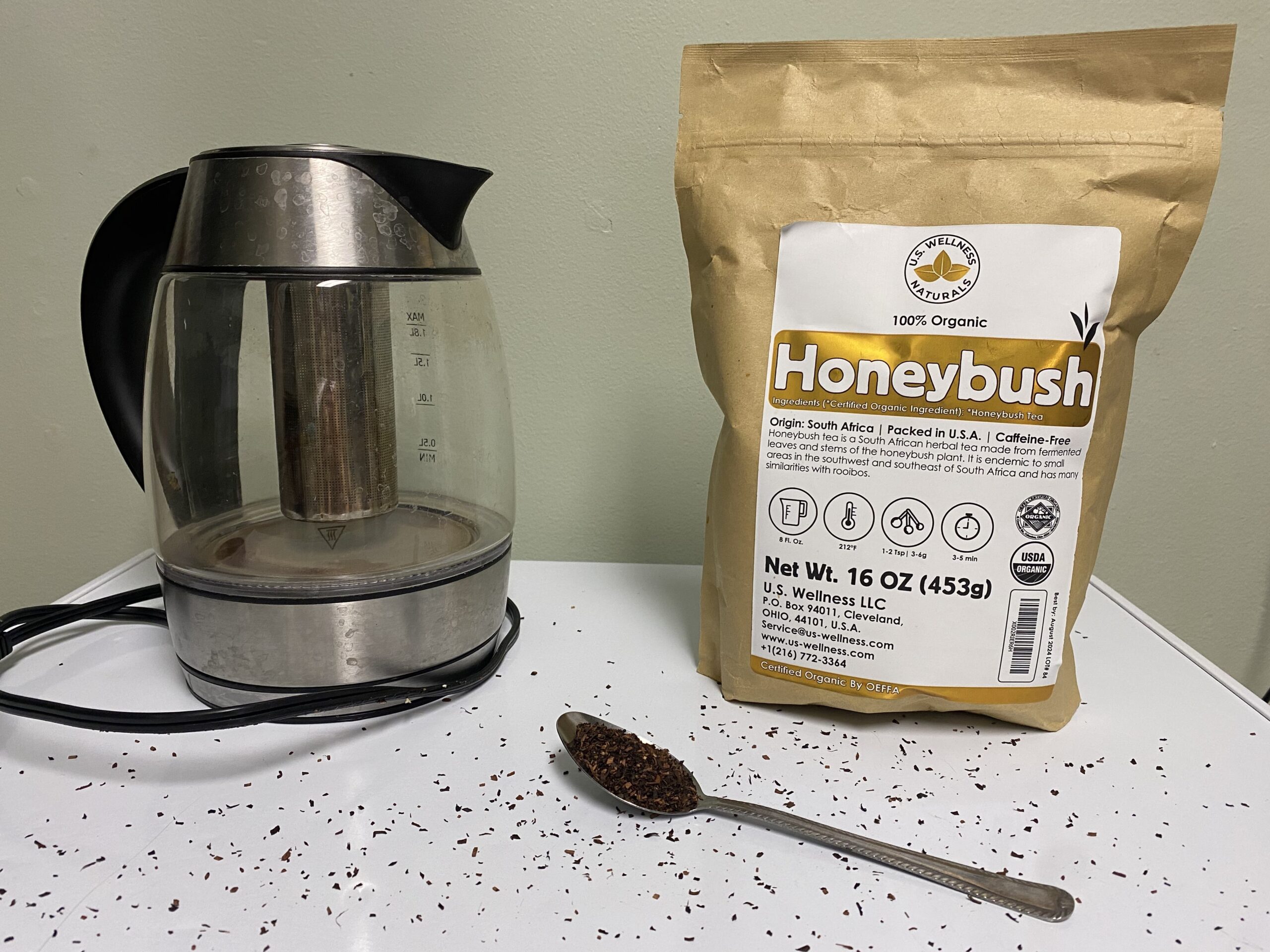Organic Honeybush Tea Review
As an Amazon Associate, I earn from qualifying purchases.
Product Overview: Organic Honeybush Tea
Website: Amazon.com
How to Make: Boiled water to 212F.

Today, I’m excited to review a tea that has become a staple in my daily routine for its numerous health benefits. This organic, zero-calorie beverage has consistently impressed me. In this article, I’ll provide a comprehensive overview, sharing all the details you need to determine if this tea is proper for you.
And yes, you can drink Honeybush tea while Intermittent fasting. Honeybush tea is caffeine-free and contains no calories or sugars, making it an excellent choice to support any fasting method.
Here are a few points to consider:
Benefits During Intermittent Fasting:
- Hydration: Honeybush tea helps keep you hydrated without adding any calories.
- Antioxidants: Honeybush tea is rich in antioxidants, which can support your body’s detoxification processes during fasting.
- Appetite Suppression: Honeybush tea has a naturally sweet flavor and can help curb cravings and reduce the feeling of hunger.
Things to Keep in Mind:
- Plain Brew: To avoid breaking your fast, drink Honeybush tea plain, without any added sweeteners, milk, or cream.
- Moderation: While it’s generally safe, it is a good practice, especially if you’re new to fasting or tea.
- Medical Conditions: If you have a health condition or are on medication, it’s advisable to consult your healthcare provider before incorporating any new tea into your routine.
Rest assured, Honeybush tea won’t break your fast.
Ok, let’s dive right in!
Imagine unlocking delightful aromas and tastes steeped in the rich soils of South Africa, which are available right at your fingertips. That’s the world of Honeybush tea that awaits you. This tea is more than meets the eye! It’s not only delicious but also packed with health benefits.
- Honeybush tea is easily found on Amazon and has two-day shipping, making it convenient and cost-effective.
- The tea’s impressive standing speaks volumes about its popularity and quality.
You’ll learn about this fascinating tea’s origins, unique characteristics, and how simple it is to incorporate into your daily routine. This isn’t just about discovering a new tea; it’s also about immersing yourself in a cultural experience that dates back centuries.
Honeybush tea is the best choice for those who want to enjoy a cup of something soothing, sweet, and steeped in history.
Don’t worry too much about mastering the art of tea-making; a simple Glass Kettle is all it takes to enjoy this herbal tea. Choose something that resonates with you on all levels—flavor, convenience, and health.
Follow me into the next section. Let’s explore what makes it so unique.
The Alluring Profile of Honeybush Tea
Step into South Africa’s natural splendor and uncover a treasure enjoyed for centuries:
The Honeybush Tea.
Honeybush is a testament to the diverse flora of this rich landscape, often called by its indigenous name, Heuningbos, and others like bergtee or mountain tea.
What distinguishes Honeybush tea from its herbal counterparts isn’t just its evocative name. It stems from the Cyclopia Plant, part of the fynbos biome that decorates the South African countryside. There’s a charm to the way Honeybush tea is the essence of its environment – a unique, naturally sweet, honey-like aroma that’s as inviting as its taste.
Honeybush Tea is Caffeine-Free.
This is good for those seeking a peaceful cup without the buzz. And it isn’t just about the flavor; it’s also about the nourishment. Each leaf contains small but mighty minerals like zinc, calcium, and iron. This tea caters to health-conscious individuals as much as to gourmet enthusiasts.
So, how do you unlock the full potential of Honeybush leaves?
The secret lies in preparation. With water boiled to 212F, the steeping process liberates the tea’s full flavors and aroma. It’s here that the pale yellow flower scent is born, rising from the cup to greet your senses even before you take the first sip.

Sipping for Well-Being: The Health Virtues of Honeybush Tea
Now, let’s delve into the array of health benefits Honeybush tea offers. I will highlight why this isn’t just a tasty beverage but a boost to your overall health.
Rich in Antioxidants: Honeybush tea is rich in antioxidants, specifically polyphenols like xanthones and flavanones. These compounds, including mangiferin and hesperidin, pack a punch against oxidative stress and have impressive anti-inflammatory properties. You’ll find out that these antioxidants may even have cancer-fighting potential.
Diabetes Management: Honeybush tea could be a valuable asset for those managing diabetes. Mangiferin lowers blood sugar levels and stimulates insulin secretion, while hesperidin regulates sugar metabolism and protects the pancreas. Together, these components suggest that honeybush tea is an ally against diabetes.
Bone Health: This drink doesn’t just taste good; it strengthens your bones too! Mangiferin acts like a tiny bodyguard, fighting off osteoclasts (cells that break down bone), while hesperidin helps build new bone by supporting osteoblasts (bone-building cells).
Skin Benefits: And guess what? This tea isn’t just about internal health; it’s also about looking and feeling great. Honeybush tea might reduce wrinkles, improve skin elasticity and hydration, offer protection against UV radiation, and reduce signs of sunburn.
Weight Management and Immune System Boost: Honeybush tea is also being researched for its potential anti-obesity effects. Thanks to phytoestrogens, it might offer relief for menopausal symptoms and boost the immune system by enhancing macrophage activity. It’s also traditionally used for alleviating colds, flu, and mucus buildup.
With these health benefits in mind, it’s clear why Honeybush tea is more than just a comforting brew. It’s a natural supplement that can contribute to a healthier, happier you. But don’t just start a Honeybush regiment yet! Up next is a quick dive into some safety precautions and user tips to ensure you enjoy Honeybush tea’s benefits to the fullest.
Enjoying Honeybush Tea Responsibly: Safety Insights and Tips
I’m here to help you maximize Honeybush tea, ensuring you enjoy its flavor and health benefits while considering essential safety aspects. Consumption of Honeybush tea can offer a spectrum of benefits as long as you’re mindful of a few precautions.
It’s fascinating how what we enjoy can interact with our bodies in complex ways.
- Quality Matters: Purchase from reputable sources to avoid microbial contamination.
- Medication Interactions: Consult a healthcare provider if you’re on medication, as Honeybush tea can influence drug-metabolizing enzymes.
- Pregnancy and Breastfeeding: Limited research suggests avoiding Honeybush tea during pregnancy and breastfeeding.
- Allergies: Those with legume allergies should consult a doctor before trying Honeybush tea.
Remember, I strongly recommend consulting a healthcare provider before adding Honeybush tea to your routine or diet, especially if you have any of the abovementioned conditions.
Embracing Honeybush tea can be a delightful addition to your wellness journey. In the next section, I’ll summarize this article and give you some final thoughts on integrating this sweet, health-conscious habit into your life.
Concluding Thoughts: Embracing the Sweetness of Honeybush Tea
In my opinion, Honeybush tea is not only a beverage; it’s a soothing ritual that brings both flavor and health benefits to your daily life. From its origins in South Africa’s floral valleys to its presence in your mug, it presents an irresistible, naturally sweet taste that’s hard to overlook.
With every sip, you’ll learn about the numerous research-backed health advantages of Honeybush tea. This herbal infusion’s potential to manage diabetes, enhance bone health, and its anti-obesity effects paint a promising picture.
Just don’t focus too much on the precautions. While they’re important to note, especially for those on medication or with specific allergies, a consultation with a healthcare provider can help you confidently include Honeybush tea in your health routine.
I hope that you explore the sweet, healthful embrace of Honeybush tea. It’s a remarkable drink that can cater to taste and health alike—truly a gem amongst herbal teas. So, pour yourself a cup and bask in its honeyed warmth.
Summary
Honeybush tea is more than a beverage; it’s a soothing ritual with numerous health benefits. Its origins in South Africa’s rich floral valleys bring a naturally sweet taste to your mug. Enjoy the antioxidants for your skin and polyphenols for metabolic health. You can confidently include Honeybush tea in your wellness routine with proper precautions.
Who knows? It might become your new favorite way to relax and enhance your well-being.
If you found this article helpful, read my other blog, Can You Drink Tea While Intermittent Fasting?
Engage with Me!
Ask Questions: If you have any questions about Honeybush tea, please leave them in the comments below. I would love to help. I’ve researched and drank the Honeybush tea and am eager to share my knowledge.


Hello Michael,
It is always refreshing to visit a site such as yours and discover how important healthy eating is in today’s world. All your articles resonate with me as I too am very into taking care of myself. I am hoping you do well with your website so the world can discover all the wonderful information you provide.
Mike Powers
Cabin Living Today
Hello Mike,
Thank you for your kind words!
I’m delighted to hear that my articles on healthy eating resonate with you. It’s always inspiring to connect with others who prioritize their well-being. Your support is greatly appreciated, and I look forward to continuing to provide valuable information for our readers.
Wishing you all the best!
Warm regards,
Michael
Thank you for such a detailed exploration of Honeybush tea, Michael! I’m intrigued by its origins and the wealth of health benefits it offers. The antioxidants and potential for managing diabetes are particularly impressive. Could you share more about the flavor profile? I’m curious how its naturally sweet aroma translates into taste. Looking forward to hearing your thoughts!
Hello, Hanna,
You’re very welcome! I’m glad you found the exploration of Honeybush tea fascinating.
The flavor of Honeybush tea is unique and delightful. It has a naturally sweet, honey-like aroma, a smooth, slightly sweet flavor, and a fruity taste.
Unlike some other teas, it has very low tannin content, so it lacks the bitterness that can accompany overstepping. Many people describe its taste as similar to rooibos but richer. I hope you can try it and enjoy its sweet flavor!
I am looking forward to hearing your thoughts once you do.
All the best,
Michael
What an interesting article. I’ve never heard of this tea and am a herbal tea drinker. I follow a low carbohydrate diet and am curious as to where its sweetness comes from. Do you know how many grams of carbohydrates there are per serving?
Have many studies been done on the benefits of the tea and by whom? I imagine it has been drunk by locals for hundreds of years, is this the case and do you know the history of the tea? I’m eager to learn more about it.
Thanks for an insightful article.
Hi Lyn,
I appreciate your interest in the article! I’m glad you’re eager to learn more about this tea. Here are some answers to your questions:
Sweetness Source and Carbohydrate Content: The sweetness of many herbal teas often comes from natural compounds found in the plants themselves, such as glycosides. The Honeybush tea is an herbal tea that is naturally low in calories and carbohydrates. A typical serving of plain honeybush tea, without any added sweeteners or flavors, contains negligible carbohydrates—usually less than 1 gram per cup.
Studies on Benefits: Various studies on the health benefits of different herbal teas have been conducted by institutions worldwide. Researchers from Stellenbosch University and the South African Medical Research Council have been particularly active in this field. Additionally, some international studies have also been conducted, reflecting growing global interest in the potential health benefits of honeybush tea.
Historical Background: Many herbal teas have a rich history and have been consumed for centuries by locals. Honeybush tea, primarily from South Africa, where it grows naturally, has a rich history that dates back centuries. Honeybush has been used traditionally by the indigenous Khoisan people of South Africa for centuries. They harvested the leaves and stems of the honeybush plant to brew an herbal infusion, which they drank for its medicinal properties and pleasant taste.
Honeybush tea holds cultural significance in South Africa, where it is not only valued for its taste but also for its historical and medicinal importance. It continues to be an essential part of South African herbal traditions and is increasingly recognized for its potential health-promoting properties worldwide.
Overall, honeybush tea has a deep-rooted history… Let me know if you have any other questions about the honeybush tea. I drink the honeybush every day. I’m having a cup right now!
Best regards,
Michael